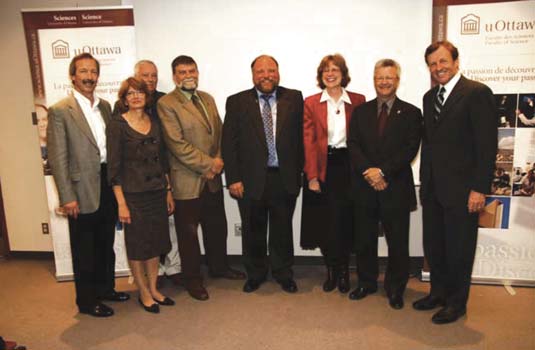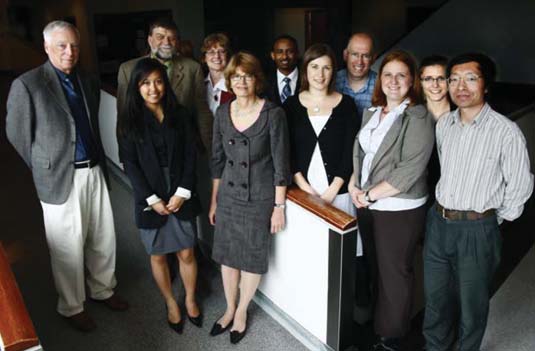Earth and Health
Earth & Health Collaborative Agreement
|
Between Health Canada and University of OttawaThe University of Ottawa and Health Canada celebrated the launch of the Earth and Health Collaborative Agreement last June. This unique collaborative agreement will strengthen the ties of shared expertise from both communities to further scientific discovery! The collaboration marks a milestone between the University of Ottawa's Department of Earth Sciences and Health Canada's Exposures and Biomonitoring Division (EBD) by joining multiple fields of expertise to promote advanced and interdisciplinary research on key areas of environmental health. Under the collaborative agreement, the University has created shared lab facilities to house Health Canada’s Inductively Coupled Plasma-Mass Spectrometer (ICPMS) and X-Ray Diffractometer (XRD) equipment and personnel in the Department of Earth Sciences’ new Geobiology and Health Lab and in the Faculty of Science XRD/XRF facility. The collaboration will undertake environmental health studies conducted under the mandate of Health Canada’s Chemicals Management Plan and Clean Air Regulatory Agenda, and the University’s Canadian Shield Research initiatives. The collaboration will establish a foundation for a Canadian network on geosciences and environmental health with international partners and seek opportunities to include other important collaborators in the field of Medical Geology. It will also enhance the profile and knowledge of human health and environment, extend the scope of environmental geochemistry to include built environments, and bridge disciplines of Earth Sciences (Geosciences) and Environmental Health Sciences. Dean André E. Lalonde opened the event and welcomed the launch by highlighting the importance of the collaboration as “l’union fait la force”, which means, “together we are stronger”. The benefits and importance of the collaborative agreement were bolstered by the speeches from Dr. Michel Robin, Chair of the Department of Earth Sciences, Dr. Pat Rasmussen, research scientist at Health Canada, and Beth Pieterson, Director General of Research and Radiation Directorate at Health Canada. The president of the University of Ottawa, Allan Rock, along with Health Canada’s EBD management team, Dr. David Blakey, Dr. Terrence Dalton, and Dr. David Moir, were among the dignitaries who attended the event to support the collaboration between the two institutions. |
|
|
|
On hand to celebrate the launch: Terrence Dalton, Beth Pieterson, David Moir, André Lalonde, Michel Robin, |
|
Dr. Rasmussen, also an Adjunct Professor at the University of Ottawa, introduced her graduate students: Michelle Nugent (PhD Candidate, "Geochemistry and Health: Spatial Techniques to Improve Manganese Exposure Assessment in Windsor, Ontario"), Lauren McDonald (MSc Candidate, "Exposure to Metals in Urban Canadian Shield Homes Assessed Using Wipe Sampling Methodologies"), and Michael Woldemichael (MSc Candidate, "The Mineralogical Composition of House Dust in Ontario"). The students presented their research during the poster session that followed. The event also provided the attendees with an opportunity to participate in a tour of the Geobiology and Health Lab. The new shared facility is located in the Department of Earth Sciences, Marion Hall Room 216. |
|
|
|
David Moir (left), André Lalonde (2nd from left), Pat Rasmussen (4th from left) and Beth Pieterson (5th from left) |
|
The Earth and Health Initiative received international recognition when MSc candidate Michael Woldemichael presented his research at the 3rd Hemispheric Conference on Medical Geology in Montevideo, Uruguay, where he was awarded the Top Student Prize for his presentation "The Mineralogical Composition of House Dust in Ontario, Canada". |
|
Text by: Michael Woldemichael, MSc candidate, University of Ottawa Christine Levesque, Health Canada |

